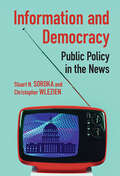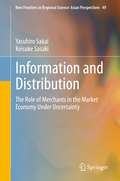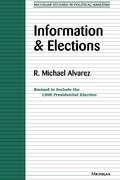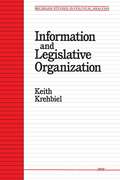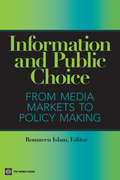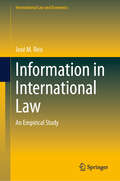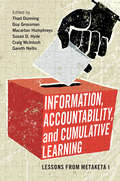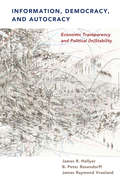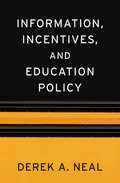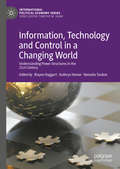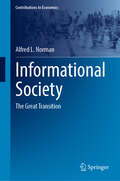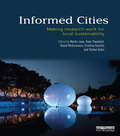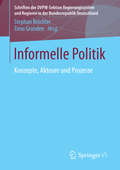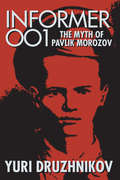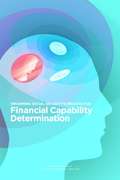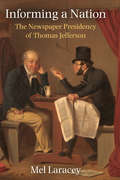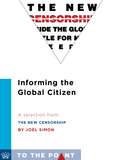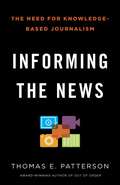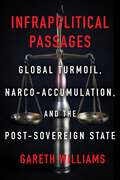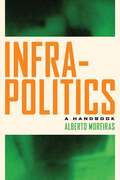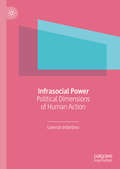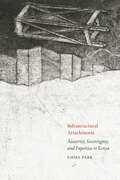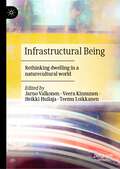- Table View
- List View
Information and Democracy: Public Policy in the News (Communication, Society and Politics)
by Stuart N. Soroka Christopher WlezienAround the world, there are increasing concerns about the accuracy of media coverage. It is vital in representative democracies that citizens have access to reliable information about what is happening in government policy, so that they can form meaningful preferences and hold politicians accountable. Yet much research and conventional wisdom questions whether the necessary information is available, consumed, and understood. This study is the first large-scale empirical investigation into the frequency and reliability of media coverage in five policy domains, and it provides tools that can be exported to other areas, in the US and elsewhere. Examining decades of government spending, media coverage, and public opinion in the US, this book assesses the accuracy of media coverage, and measures its direct impact on citizens' preferences for policy. This innovative study has far-reaching implications for those studying and teaching politics as well as for reporters and citizens.
Information and Distribution: The Role of Merchants in the Market Economy Under Uncertainty (New Frontiers in Regional Science: Asian Perspectives #49)
by Yasuhiro Sakai Keisuke SasakiThe purpose of this book is to discuss the relationship between information and distribution, with special reference to the role of the merchant in a market economy under conditions of risk and uncertainty. By working with simple models of the market economy and conducting a sequence of comparative analyses, the authors shed new light on an important yet rather neglected area in economics. In a historical perspective, the merchants of Ohmi, the former name of Shiga Prefecture in western Japan, are known to have put great faith in the principles of Sampo Yoshi or the all-around advantages of trading. It is hoped that the results presented in this book will provide some solid ground for such an old principle that can be seen in a new light. Applications to regional and many related problems are also discussed here. A distribution system is broadly defined as the systematic mechanisms and structures that regulate business operations, and its function is to maximize corporate value. Some of the following functions have previously been identified as distinguishing features of the Japanese distribution system compared with distribution systems in Europe and the United States: not only transactions, transportation, and storage, but also information, risk-bearing functions, and other characteristics. This book provides an overview of the distribution system in Japan, including changes that its practice have undergone and its current state; identifies current problems; and considers how these problems should be addressed.
Information and Elections
by R. Michael AlvarezR. Michael Alvarez examines how voters make their decisions in presidential elections. He begins with the assumption that voters have neither the incentive nor the inclination to be well-informed about politics and presidential candidates. Candidates themselves have incentives to provide ambiguous information about themselves, their records and their issue positions. Yet the author shows that a tremendous amount of information is made available about presidential candidates. And he uncovers clear and striking evidence that people are not likely to vote for candidates about whom they know very little. Alvarez explores how voters learn about candidates through the course of a campaign. He provides a detailed analysis of the media coverage of presidential campaigns and shows that there is a tremendous amount of media coverage of these campaigns, that much of this coverage is about issues and is informative, and that voters learn from this coverage. The paperback edition of this work has been updated to include information on the 1996 Presidential election. Information and Electionsis a book that will be read by all who are interested in campaigns and electoral behavior in presidential and other elections. "Thoughtfully conceptualized, painstakingly analyzed, with empirically significant conclusions on presidential election voting behavior, this book is recommended for both upper-division undergraduate and graduate collections. " --Choice R. Michael Alvarez is Associate Professor of Political Science, California Institute of Technology.
Information and Legislative Organization
by Keith KrehbielPresents an alternative informational theory of legislative politics to challenge the conventional view
Information and Public Choice: From Media Markets to Policymaking
by Roumeen IslamThe ability of the media to affect outcomes in economic and political markets has been well documented. News reporting and advertising influence consumer behavior in goods and services markets by revealing (or selectively revealing) information about a product, acting as agenda setters to influence consumer demand, or enhancing competition in markets by alerting consumers to substitutes. In political markets, they can affect behavior by informing voters about a politician's views or actions, enlightening citizens to outcomes of public policy, or taking a stance on political, social, or economic issues. For businesses, households, and most others, the media is the main source of information on public policy choices and current social and economic conditions. As a result, what news the media chooses to gather, analyze and disseminate--and the slant they choose to put on what they report--is of consequence. 'Information and Public Choice' addresses the factors that affect the content and reach of news coverage as well as its impact on public policy. The book addresses both market constraints that affect media--particularly news content--and the impact that news reporting has on economic and political choices. The authors examine a range of issues, including bias or slant in media reporting, the impact of markets and nonmarket factors on news reporting, and the role of government regulation of the media sector in developing countries. The studies in this volume provide new evidence and a good summary of previous research on the power of the media. An invaluable guide for those concerned about the impact of media on economic and political outcomes, 'Information and Public Choice' draws attention to an under-researched yet important area of economics.
Information in International Law: An Empirical Study (International Law and Economics)
by José M. ReisExamining state behavior, this book sheds light on the often-overlooked role of information production and diffusion in international law and relations. Most theories of public international law and state behavior rely on a certain degree of international law-related information, such as an international legal ruling, being made public and diffused to reach various key actors such as third states or domestic actors. However, while assumptions about information being produced and diffused permeate international legal scholarly work, these assumptions have not been systematically and empirically evaluated. Based on an empirical analysis, the author challenges prevailing assumptions by systematically evaluating the accessibility and dissemination of crucial international law related information such as treaty negotiation documents or legal rulings. Using a variety of quantitative case studies on key stages of international lawmaking and covering various issue-areas, from human rights to trade law, each chapter traverses three critical levels of analysis, namely whether international law information is public and transparent, whether the information is salient and reaches the general public, and how the information is framed by the media and political elites. The book will appeal to students, researchers, and scholars of law, political science, and economics, as well as policy-makers interested in a better understanding of information production and diffusion in international law and the impact of public opinion on compliance with international law.
Information, Accountability, and Cumulative Learning: Lessons from Metaketa I (Cambridge Studies in Comparative Politics)
by Susan D. Hyde Thad Dunning Macartan Humphreys Guy Grossman Craig McIntosh Gareth NellisThroughout the world, voters lack access to information about politicians, government performance, and public services. Efforts to remedy these informational deficits are numerous. Yet do informational campaigns influence voter behavior and increase democratic accountability? Through the first project of the Metaketa Initiative, sponsored by the Evidence in Governance and Politics (EGAP) research network, this book aims to address this substantive question and at the same time introduce a new model for cumulative learning that increases coordination among otherwise independent researcher teams. It presents the overall results (using meta-analysis) from six independently conducted but coordinated field experimental studies, the results from each individual study, and the findings from a related evaluation of whether practitioners utilize this information as expected. It also discusses lessons learned from EGAP's efforts to coordinate field experiments, increase replication of theoretically important studies across contexts, and increase the external validity of field experimental research.
Information, Democracy and Autocracy: Economic Transparency and Political (In)Stability
by James Raymond Vreeland James R. Hollyer B. Peter RosendorffAdvocates for economic development often call for greater transparency. But what does transparency really mean? What are its consequences? This breakthrough book demonstrates how information impacts major political phenomena, including mass protest, the survival of dictatorships, democratic stability, as well as economic performance. The book introduces a new measure of a specific facet of transparency: the dissemination of economic data. Analysis shows that democracies make economic data more available than do similarly developed autocracies. Transparency attracts investment and makes democracies more resilient to breakdown. But transparency has a dubious consequence under autocracy: political instability. Mass-unrest becomes more likely, and transparency can facilitate democratic transition - but most often a new despotic regime displaces the old. Autocratic leaders may also turn these threats to their advantage, using the risk of mass-unrest that transparency portends to unify the ruling elite. Policy-makers must recognize the trade-offs transparency entails.
Information, Incentives, and Education Policy (The\sanford J. Grossman Lectures In Economics Ser.)
by Derek A. NealHow do we ensure that waste and inefficiency do not undermine the mission of publicly funded schools? Derek Neal writes that economists must analyze education policy in the same way they analyze other procurement problems. Insights from research on incentives and contracts in the private sector point to new approaches that could induce publicly funded educators to provide excellent education, even though taxpayers and parents cannot monitor what happens in the classroom. Information, Incentives, and Education Policy introduces readers to what economists know—and do not know—about the logjams created by misinformation and disincentives in education. Examining a range of policy agendas, from assessment-based accountability and centralized school assignments to charter schools and voucher systems, Neal demonstrates where these programs have been successful, where they have failed, and why. The details clearly matter: there is no quick-and-easy fix for education policy. By combining elements from various approaches, economists can help policy makers design optimal reforms. Information, Incentives, and Education Policy is organized to show readers how standard tools from economics research on information and incentives speak directly to some of the most crucial issues in education today. In addition to providing an overview of the pluses and minuses of particular programs, each chapter includes a series of exercises that allow students of economics to work through the mathematics for themselves or with an instructor’s assistance. For those who wish to master the models and tools that economists of education should use in their work, there is no better resource available.
Information, Power, and Democracy
by Nico StehrThe link between liberty and knowledge is neither static nor simple. Until recently the mutual support between knowledge, science, democracy and emancipation was presupposed. Recently, however, the close relationship between democracy and knowledge has been viewed with skepticism. The growing societal reliance on specialized knowledge often appears to actually undermine democracy. Is it that we do not know enough, but that we know too much? What are the implications for the freedom of societies and their citizens? Does knowledge help or heed them in unraveling the complexity of new challenges? This book systematically explores the shifting dynamics of knowledge production and the implications for the conditions and practices of freedom. It considers the growth of knowledge about knowledge and the impact of an evolving media. It argues for a revised understanding of the societal role of knowledge and presents the concept of 'knowledge societies' as a major resource for liberty.
Information, Technology and Control in a Changing World: Understanding Power Structures in the 21st Century (International Political Economy Series)
by Blayne Haggart Natasha Tusikov Kathryn HenneThis book explores the interconnected ways in which the control of knowledge has become central to the exercise of political, economic, and social power. Building on the work of International Political Economy scholar Susan Strange, this multidisciplinary volume features experts from political science, anthropology, law, criminology, women’s and gender studies, and Science and Technology Studies, who consider how the control of knowledge is shaping our everyday lives. From “weaponised copyright” as a censorship tool, to the battle over control of the internet’s “guts,” to the effects of state surveillance at the Mexico–U.S. border, this book offers a coherent way to understand the nature of power in the twenty-first century.
Informational Society: The Great Transition (Contributions to Economics)
by Alfred L. NormanThis book explores the transition into a future economy where human work is largely replaced by automation. As this transition takes place job destruction will outpace job creation resulting in increasing unemployment. The author theorizes that the key challenges in managing this transition will be providing income for the unemployed, reforming a government dominated by the wealthy and corporate interests, and creating new social structures to replace work as a central focus of life. The book begins with a discussion of the concept of bounded rationality and how it influences the pace of technological adoption. The author also discusses how advances in technology—particularly in automation—affect both physical and informational tasks, transforming industries and reducing employment across sectors. Next, the author turns to government, addressing successes and failures in addressing current issues like climate change, immigration, economic inequality, and government capture by the wealthy and corporations. Government reform is essential for managing the social and economic impacts of automation. Positing that the transition period will begin between 2030 and 2050, the author recommends that planning should begin now to implement solutions, including a negative income tax, affordable housing, and a shift towards leisure-based social organization.
Informed Cities: Making Research Work for Local Sustainability
by Marko Joas Kate Theobald Cristina Garzillo David McGuinness Stefan KuhnInformed Cities looks at the knowledge brokerage processes between cities and higher education institutions, and in particular evaluates governance mechanisms for monitoring local sustainability and the role of research within this. The first part of the book provides an analysis of tools for governing sustainable cities and develops a typology of existing tools. It then considers approaches to monitor local sustainability on a European level, focusing on a number of key tools such as the Covenant of Mayors, Reference Framework for Sustainable Cities, and Green Capital Award. The second part of the book introduces an explorative application of two tools that the author team have used in practice to monitor local sustainability, Urban Ecosystems Europe and Local Evaluation 21, presenting and evaluating European level data collected from local governments. The third part of the book looks deeper into a number of case studies discussing how a working and rewarding city-university connection can be created and nourished in an administrative and political setting. Finally, the last part of the book reflects on lessons learned from the application of the tools and accompanying research process and makes recommendations for further developing monitoring tools for urban sustainability on a European level. This book will be essential reading for professionals in urban and regional planning who are tasked with monitoring the effects of sustainability policies, as well as for graduate students in planning, environmental governance, sustainable development and related disciplines.
Informelle Politik
by Stephan Bröchler Timo Grunden,,Wirklich wichtige Entscheidungen werden ausnahmslos in Gremien getroffen, die es nicht gibt. " Walter Scheel wird gewusst haben, wovon er sprach. Die Verfassungswirklichkeit der Bundesrepublik Deutschland erschließt sich nicht allein durch das Staatsorganisationsrecht. Regieren ist auch ein Prozess, der in informelle Entscheidungszentren verlagert wird, der ungeschriebenen Regeln folgt und den beteiligten Akteuren ein politisches Praxiswissen abverlangt. Aus diesem Grund wird ,,informelles Regieren" immer mehr zu einem Schlüsselbegriff der Regierungsforschung. Die informellen Institutionen und politischen Praktiken des Regierens sind der Gegenstand dieses Bandes. Die Autorinnen und Autoren setzen sich kritisch mit Analysekonzepten zum ,,Informellen Regieren" auseinander und präsentieren neue empirische Erkenntnisse.
Informer 001: The Myth of Pavlik Morozov
by Yuri DruzhnikovWhen Russia was in the throes of Joseph Stalin's campaign for the forced collectivization of Soviet agriculture, a young boy named Pavlik Morozov informed the OGPU (later called the KGB) that his father was an enemy of the regime. As a result, Pavlik's father was arrested and disappeared in a Soviet concentration camp. Enemies of the party later killed the boy, whereupon people proclaimed him a hero. After that, Pavlik Morozov's glory surpassed the fame of many Russian heroes. Hundreds of works have been published about the boy in various genres; his portrait has graced galleries, postcards, and postage stamps; ships and libraries have been dedicated in his honor.Informer 001 is the first independent study of the Morozov affair. Yuri Druzhnikov examined documents, visited museums, and interviewed everyone who knew Morozov during his short lifetime. In book after book, he discovered inconsistencies in every fact, from where Morozov was born to how old he was at the time of his death.As Druzhnikov pieced together the story about Morozov's life, death, and legacy, it became clear that the campaign to keep Morozov a hero was centrally directed. Informer hero number 001 remained a fearful reminder to all; to those who inform, and those who become the victims of denunciations. Informer 001 offers Western readers a unique glimpse into the behind-the-scenes operations of Soviet political history and will be fascinating for the general public, as well as for sociologists, historians, and Russian studies specialists.
Informing Social Security’s Process for Financial Capability Determination
by Engineering Medicine National Academies of SciencesThe U.S. Social Security Administration (SSA) provides benefits to disabled adults and children, offering vital financial support to more than 19 million disabled Americans. Of that group, approximately 5.5 million have been deemed – by virtue of youth or mental or physical impairment - incapable of managing or directing the management of their benefits. Hence, a representative payee has been appointed to receive and disburse SSA payments for these beneficiaries to ensure that their basic needs for shelter, food, and clothing are met. Periodically, however, concerns have been expressed about the accuracy of the process by which SSA determines whether beneficiaries are capable of managing their benefits, with some evidence suggesting that underdetection of incapable recipients may be a particular problem. The importance of creating as accurate a process as possible for incapability determinations is underscored by the consequences of incorrectly identifying recipients either as incapable when they can manage their benefits or as capable when they cannot. Failure to identify beneficiaries who are incapable of managing their funds means abandoning a vulnerable population to potential homelessness, hunger, and disease. Informing Social Security’s Process for Financial Capability Determination considers capability determination processes used by other similar benefit programs, abilities required to manage, and direct the management of, benefits, and effective methods and measures for assessing capability. This report evaluates SSA’s capability determination process for adult beneficiaries and provides recommendations for improving the accuracy and efficiency of the agency’s policy and procedures for making these determinations.
Informing a Nation: The Newspaper Presidency of Thomas Jefferson
by Melvin LaraceyDuring his presidency, Thomas Jefferson both sponsored and wrote for his own newspaper, the National Intelligencer and Washington Advertiser. The newspaper spoke on behalf of his policies and those of his Republican, anti-federalist party, the Democratic-Republicans, the precursor to today’s Democrats. Author Mel Laracey focuses on the newspaper’s message during Jefferson’s first term, showing how the third president used media to promote his administration and its goals against their political rivals, the Federalists. Informing a Nation shows how Jefferson and his allies dealt with political challenges, reveals hitherto unexamined aspects of the early presidency, and raises broad questions of the relationship between the presidency and media today.
Informing the Global Citizen: A Selection from The New Censorship: Inside the Global Battle for Media Freedom (To the Point)
by Joel SimonToday, anyone with an iPhone can provide firsthand accounts from the world's front lines. Despite our increased access to events around the world, journalists are more vital than ever as they bring context and perspective and help to set the humanitarian agenda. However, threats to journalists are mounting with record numbers killed and imprisoned each year. From the drug wars of Mexico to Iraq and Tahrir Square, Joel Simon explores the new challenges and dangers to the future of journalistic freedom.
Informing the Global Citizen: Inside the Global Battle for Media Freedom
by Joel SimonToday, anyone with an iPhone can provide firsthand accounts from the world's front lines. Despite our increased access to events around the world, journalists are more vital than ever as they bring context and perspective and help to set the humanitarian agenda. However, threats to journalists are mounting with record numbers killed and imprisoned each year. From the drug wars of Mexico to Iraq and Tahrir Square, Joel Simon explores the new challenges and dangers to the future of journalistic freedom.
Informing the News
by Thomas E. PattersonAs the journalist Walter Lippmann noted nearly a century ago, democracy falters "if there is no steady supply of trustworthy and relevant news." Today's journalists are not providing it. Too often, reporters give equal weight to facts and biased opinion, stir up small controversies, and substitute infotainment for real news. Even when they get the facts rights, they often misjudge the context in which they belong. Information is the lifeblood of a healthy democracy. Public opinion and debate suffer when citizens are misinformed about current affairs, as is increasingly the case. Though the failures of today's communication system cannot be blamed solely on the news media, they are part of the problem, and the best hope for something better. Patterson proposes "knowledge-based journalism" as a corrective. Unless journalists are more deeply informed about the subjects they cover, they will continue to misinterpret them and to be vulnerable to manipulation by their sources. In this book, derived from a multi-year initiative of the Carnegie Corporation and the Knight Foundation, Patterson calls for nothing less than a major overhaul of journalism practice and education. The book speaks not only to journalists but to all who are concerned about the integrity of the information on which America's democracy depends.
Infrapolitical Passages: Global Turmoil, Narco-Accumulation, and the Post-Sovereign State
by Gareth WilliamsThis book makes a case for infrapolitics as an enactment of intellectual responsibility in the face of a tumultuous world of war and of technological value extraction on a planetary scale. Infrapolitical Passages proposes to clear a way through some of the dominant political determinations and violent symptoms of contemporary globalization. In doing so, Gareth Williams makes a case for infrapolitics as an enactment of intellectual responsibility in the face of a tumultuous world of war and of technological value extraction on a planetary scale. The book offers a theory of globalization as a gigantic, directionless crisis in humanity’s symbolic organization, as well as a theory of global economic warfare as the very positing of directionlessness and, at the same time, facticity. Williams’s infrapolitics stands at a distance from the biopolitical, which it understands as domination presenting itself as the production of specific forms of subjectivity in the face of the commodity. The subsequent obscuring of being signals the need to circumvent the instrumentalization of life as subordination to the metaphysics of subjectivity, representation, and politics. Infrapolitical Passages works to confront that which is unavailable in subjectivity and representation, opening a way for facticity in the age of globalization in order to make room for the infrapolitical question for existence.
Infrapolitics: A Handbook
by Alberto MoreirasThe personal is not political, even if politics marks it and, in many cases, determines it. Infrapolitics seeks to understand conditions of existence that are not reducible to political life and that exceed any definition of world bound to political determinations. It seeks to mobilize an exteriority without which politics could only be business or administration, that is, oppression. It demands a change in seeing and an everyday practice that subtracts from political totalization in the name of a new production of desire, of a new emancipation, and of a conception of experience that can breach the general captivation of life.In this book, Alberto Moreiras describes a form of thought aiming to provide content for a form of life and to offer a new theoretical practice for concrete existence. The book provides a genealogy of the notion of infrapolitics and places it within contemporary philosophical reflection, examining its deployment in the wake of postphenomenology and deconstruction, Lacanian analysis, the principle of anarchy, and an egalitarian symbolization of social life. In doing so, Moreiras elaborates Infrapolitics as both a general critique of the political apparatus and as an imperative horizon for existential self-understanding.
Infrasocial Power: Political Dimensions of Human Action
by Lorenzo InfantinoBuilding from the level of individual interaction, this book intends to shed light on what the author terms "infrasocial power" and the relation between this individual-actor oriented level and public power. In overviewing the origins of power, the author allows for the disaggregation of the social fabric, thus making it possible to: 1) isolate the “sequence” in which the phenomenon of superordination and subordination materialises; 2) identify the institutional “instruments” which can be used to limit infrasocial power; 3) discriminate between a social position achieved through engagement with others (and what we are capable of doing for them) from one occupied by means of force and deception; 4) explain the birth and function of public power; and 5) analyze the consequences produced by different political regimes.
Infrastructural Attachments: Austerity, Sovereignty, and Expertise in Kenya
by Emma ParkSet against critiques of neoliberal capitalism in the present, Infrastructural Attachments argues that the technopolitics of austerity have been the organizing logic of statecraft in Kenya since the late nineteenth century, calling into question the novelty of austerity as a mode of governance and a lived experience. Using infrastructures as a lens to explore state formation over the long twentieth century—roads in the early colonial period, radio broadcasting from the interwar through the postwar periods, and mobile phones and digital financial services in the present—historian Emma Park reveals that as the state drew on private capital to make up for limited budgets, it inaugurated a peculiar political-economic form: the corporate-state. For more than a century—in pursuit of minimizing costs and maximizing profits—the corporate-state crucially relied on the exploitation and expropriation of its subject-citizens. By foregrounding these workers, Park interrogates how Kenyans’ knowledge and expertise has been rescaled and subsumed, quietly underwriting the development of infrastructural expertise, the circuits of finance upon which (post)colonial infrastructural expansion has been premised, and the forms of profit-making it has enabled.
Infrastructural Being: Rethinking dwelling in a naturecultural world
by Jarno Valkonen Veera Kinnunen Heikki Huilaja Teemu LoikkanenThis book provides a comprehensive insight into the contemporary naturecultural world by exploring infrastructures through the dwelling approach. The notion of naturecultures has been utilized in environmental humanities and social sciences to emphasize the inherent messiness of the lived world and the inseparability of social and biophysical elements. Concept of naturecultures stresses that seemingly “natural” is always simultaneously “cultural” and vice versa. This approach allows fleshing out the messy engagements with infrastructures, which in this book is conceptualized as infrastructural being. This book is a contribution to emerging discussions on infrastructures in the fields of environmental social sciences and humanities. It sensitizes to the peculiarities of modern dwelling and modern, yet often overlooked, ways of being connected with nature. Moreover, it provides tools for speculating, how could things be otherwise. The book is a topical response to the urgent call for developing new forms of human-nature relations in times of environmental turbulence.
